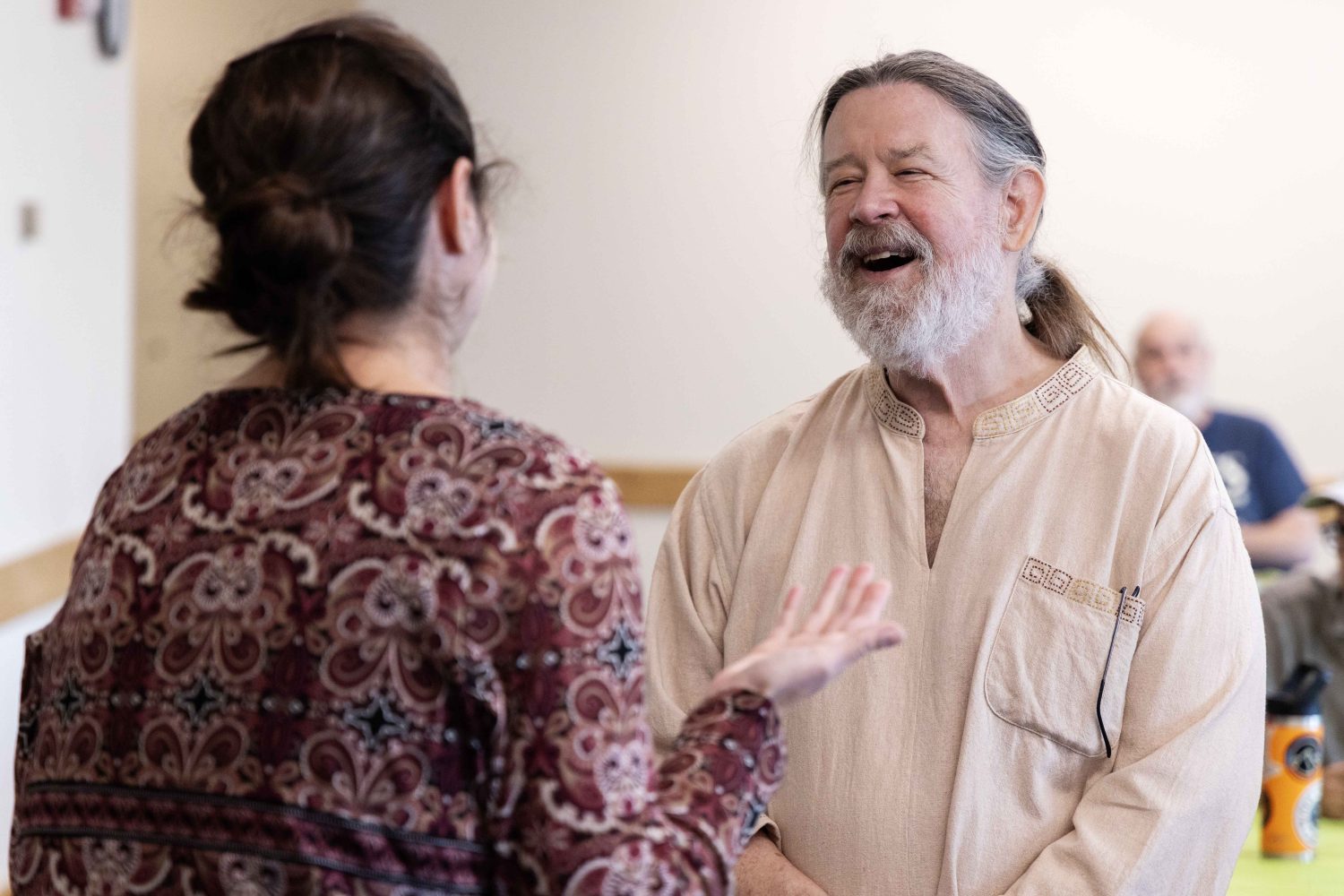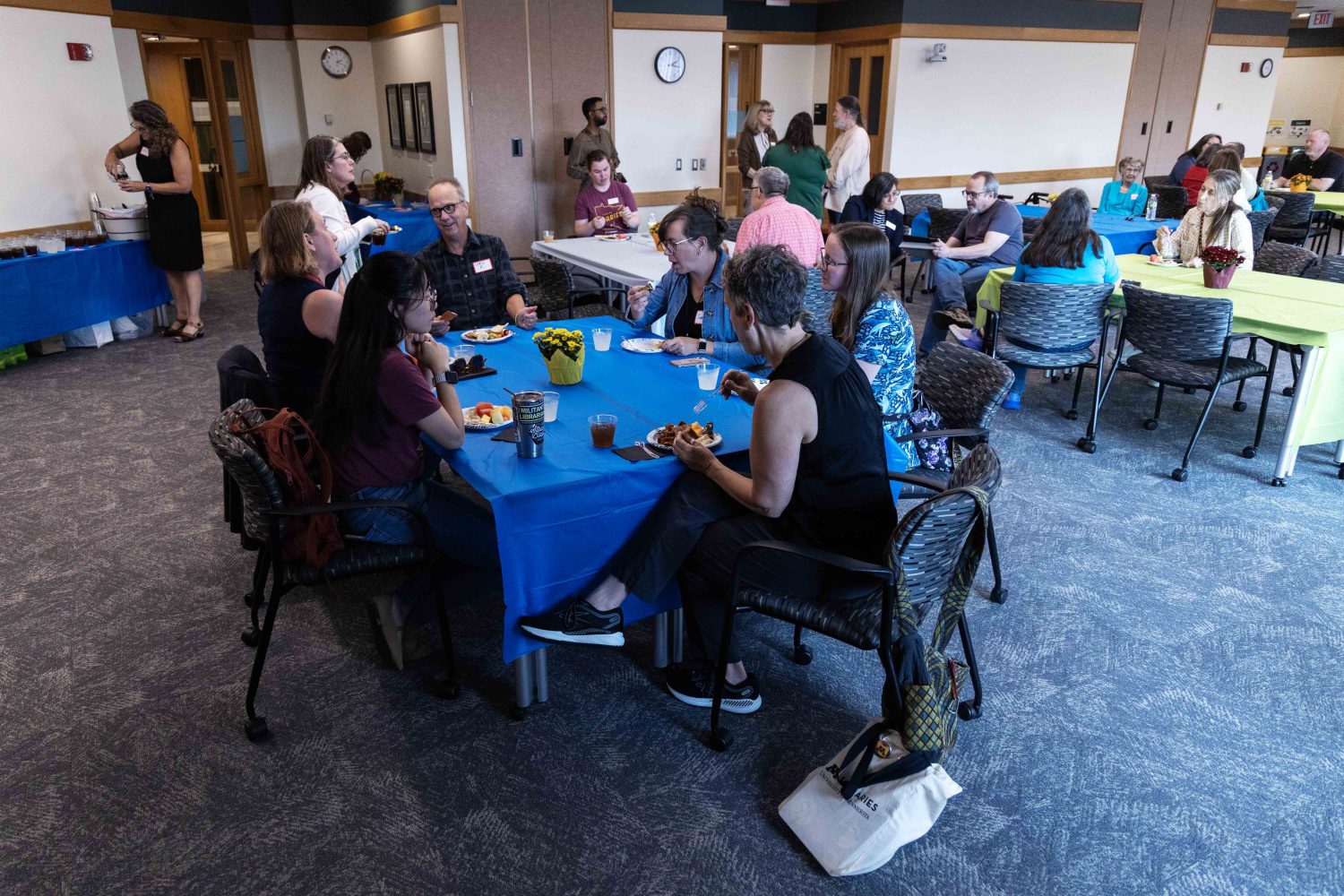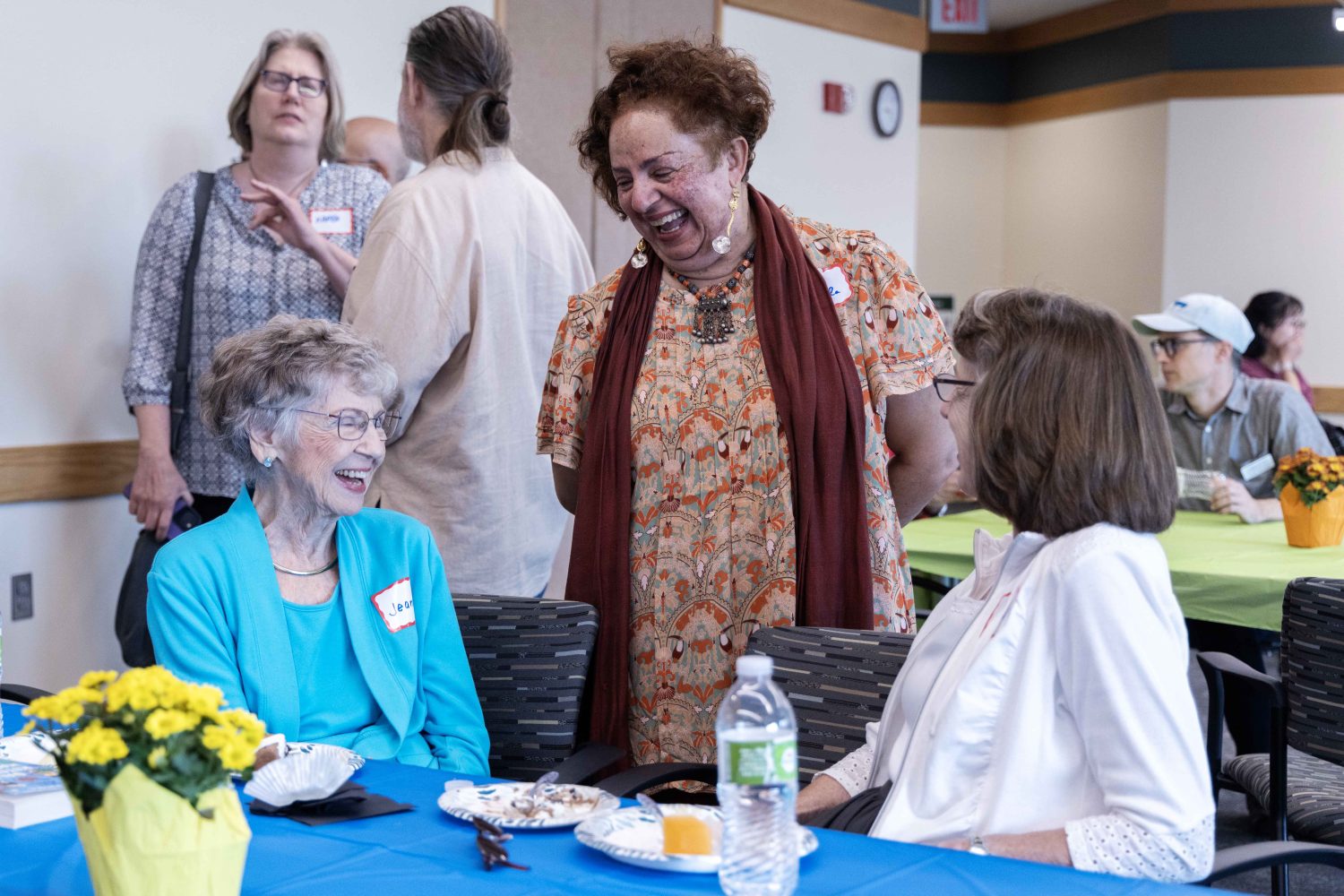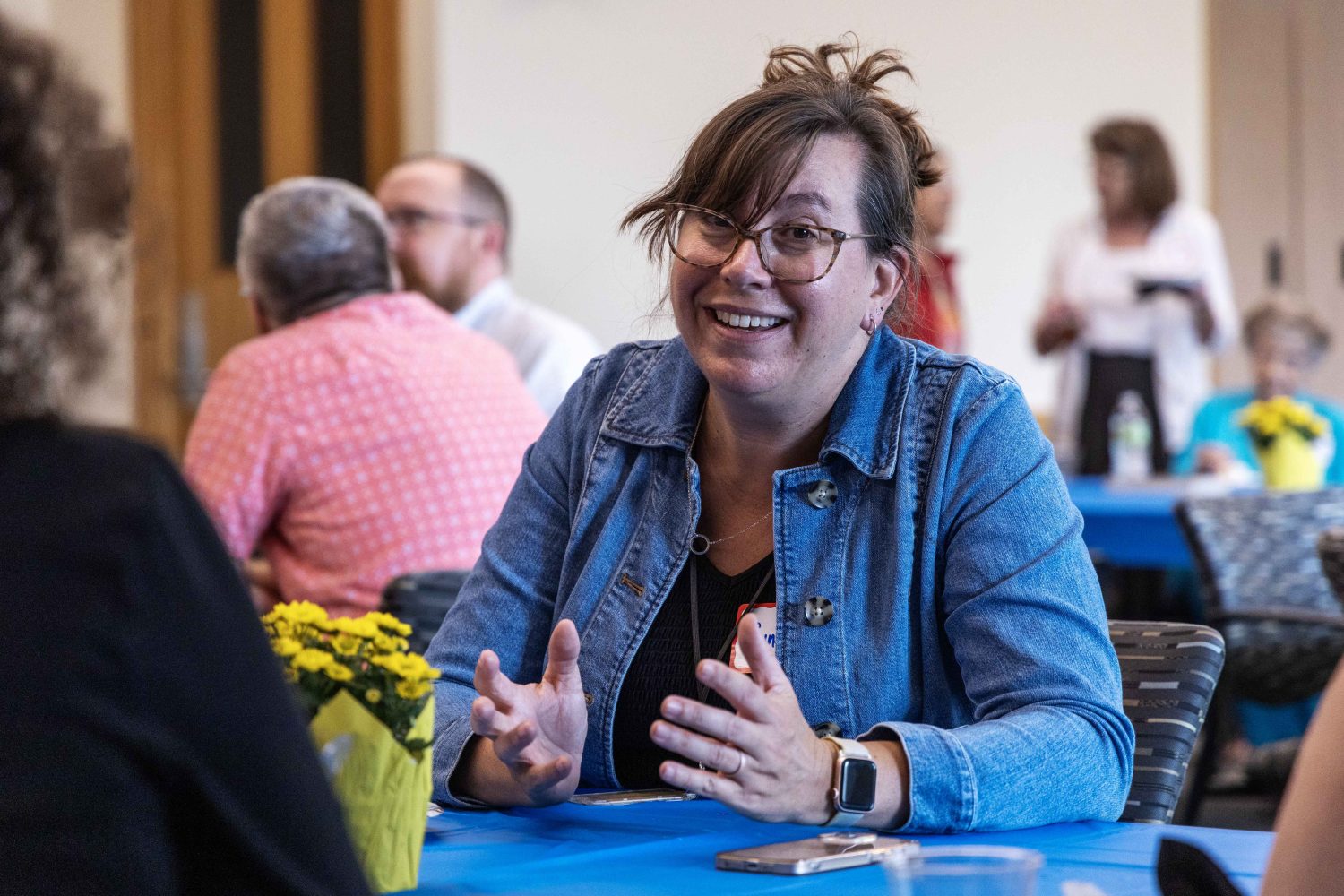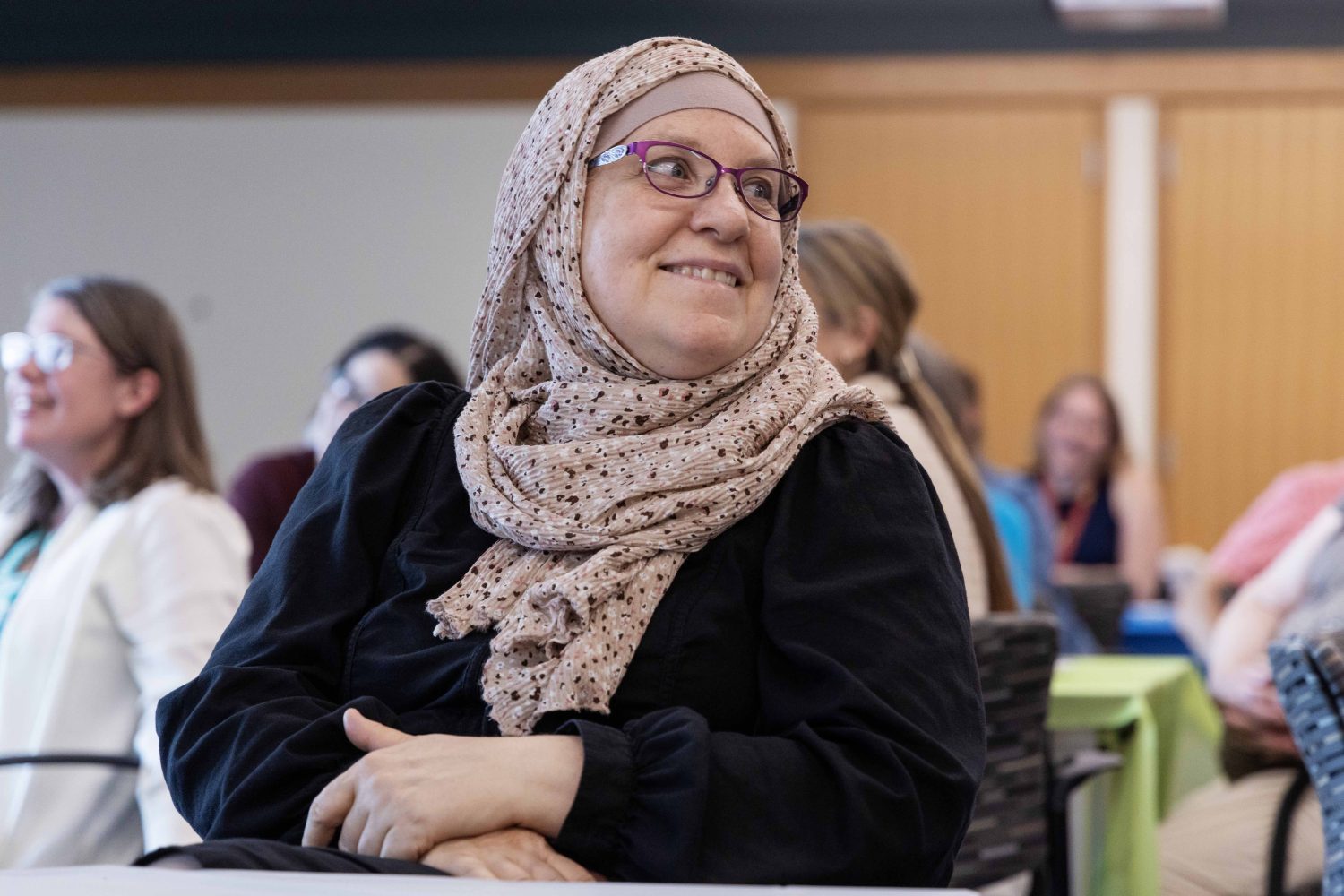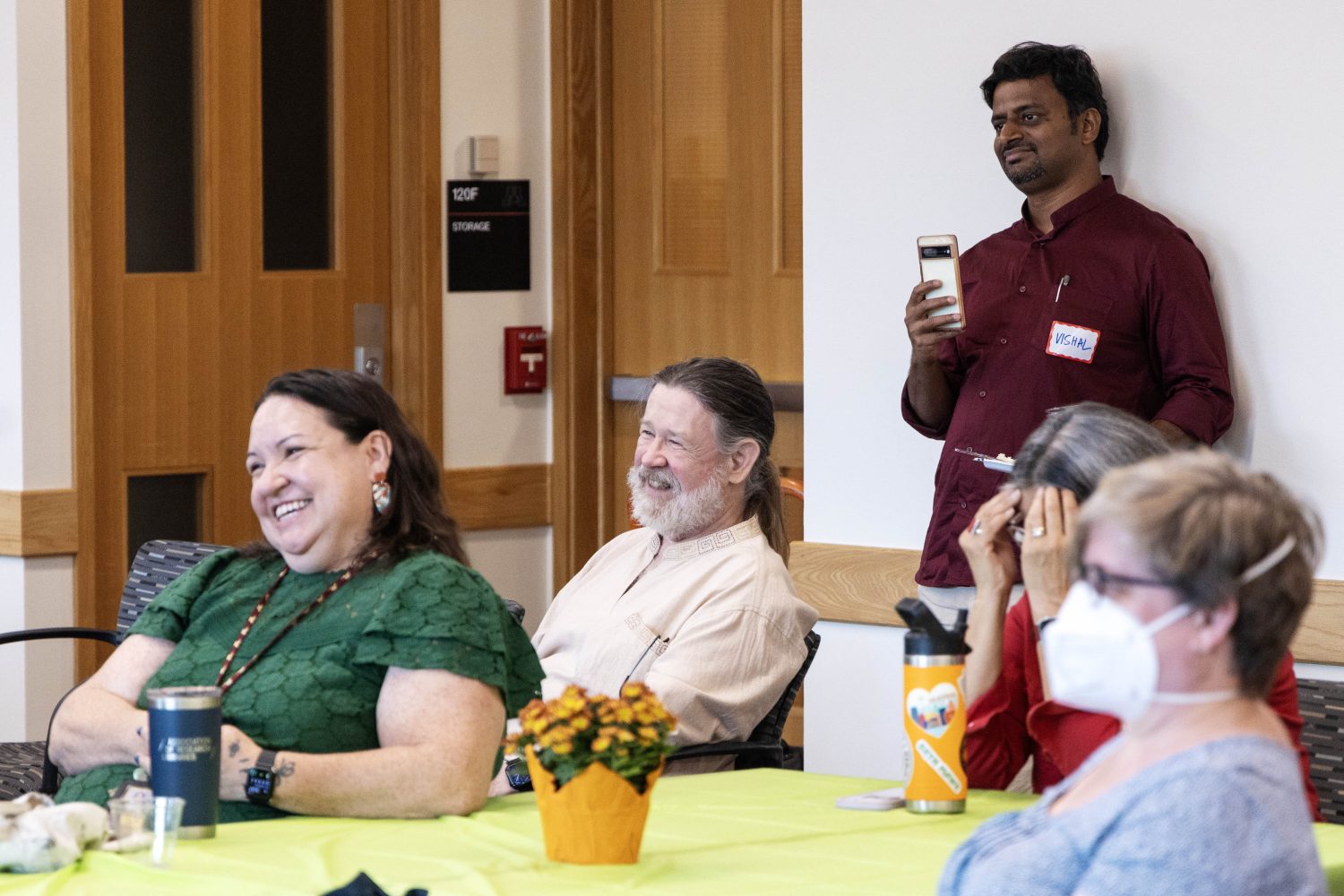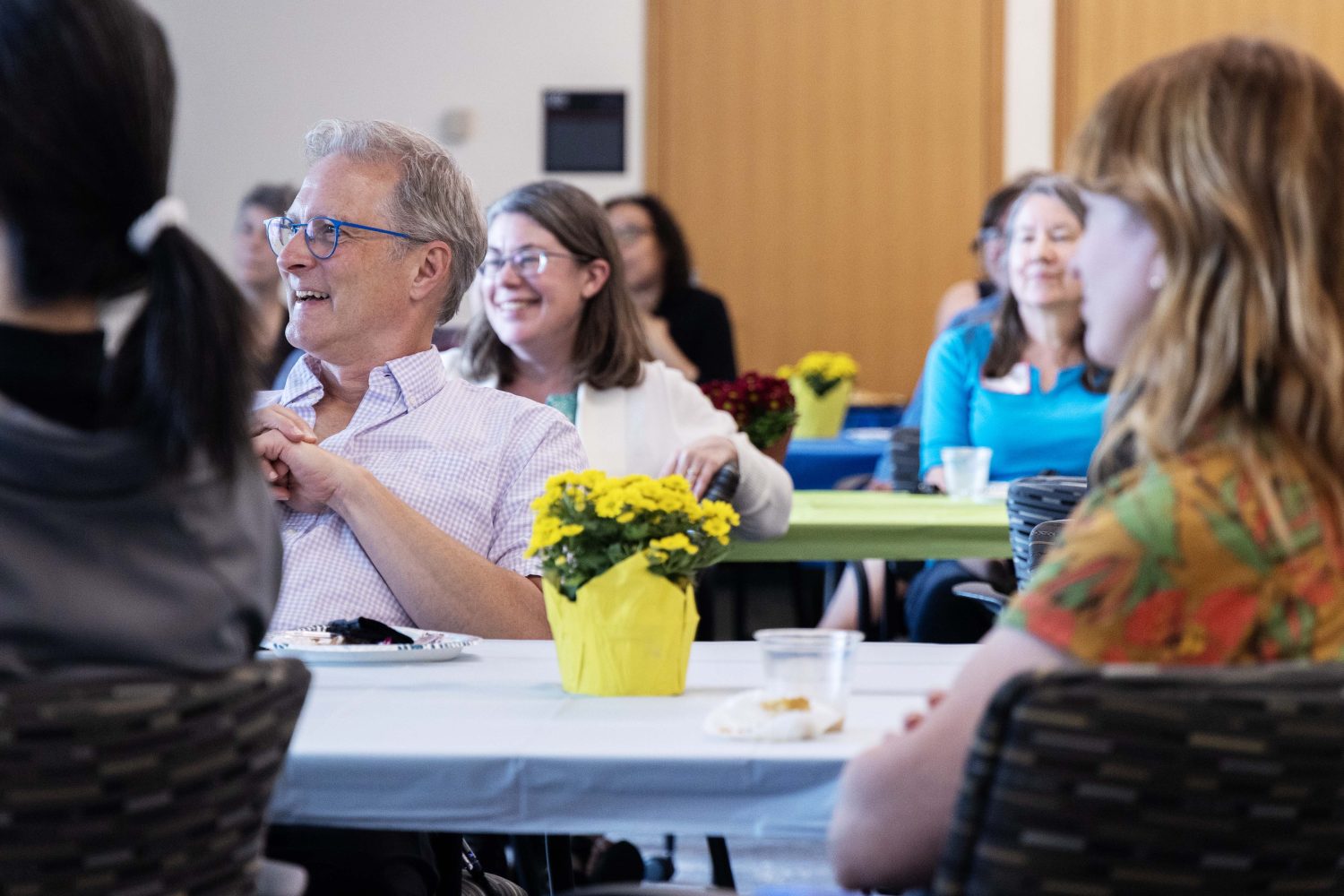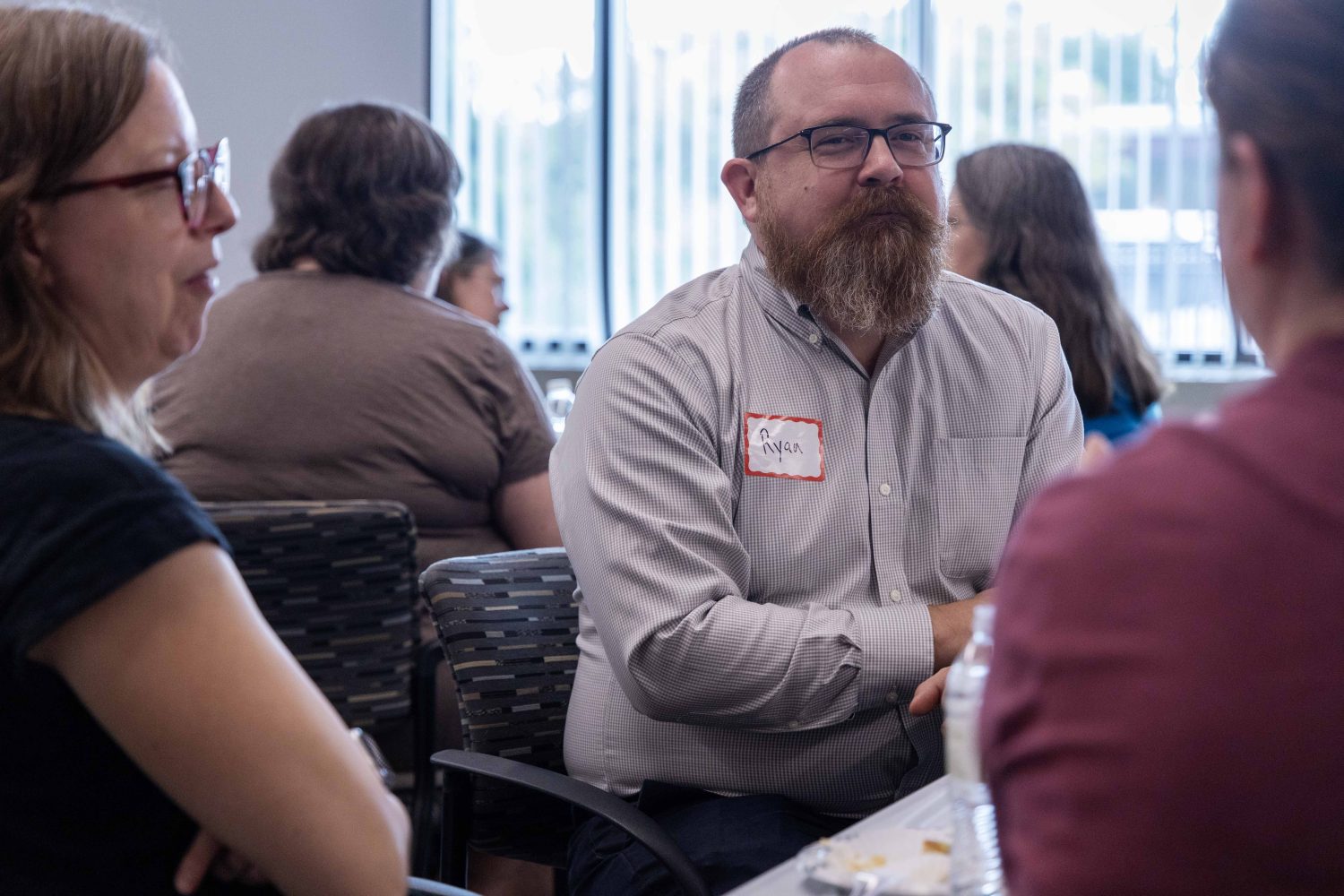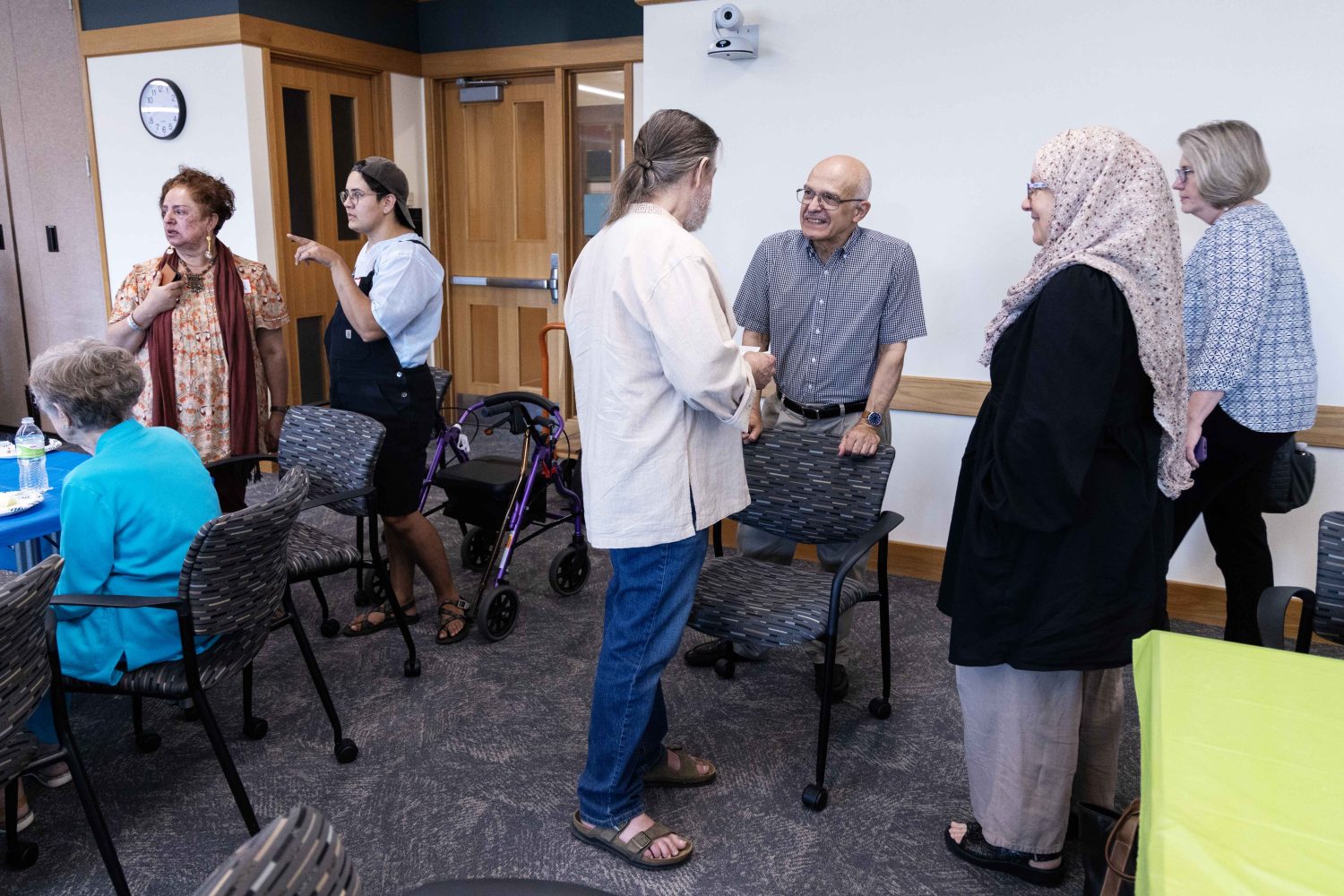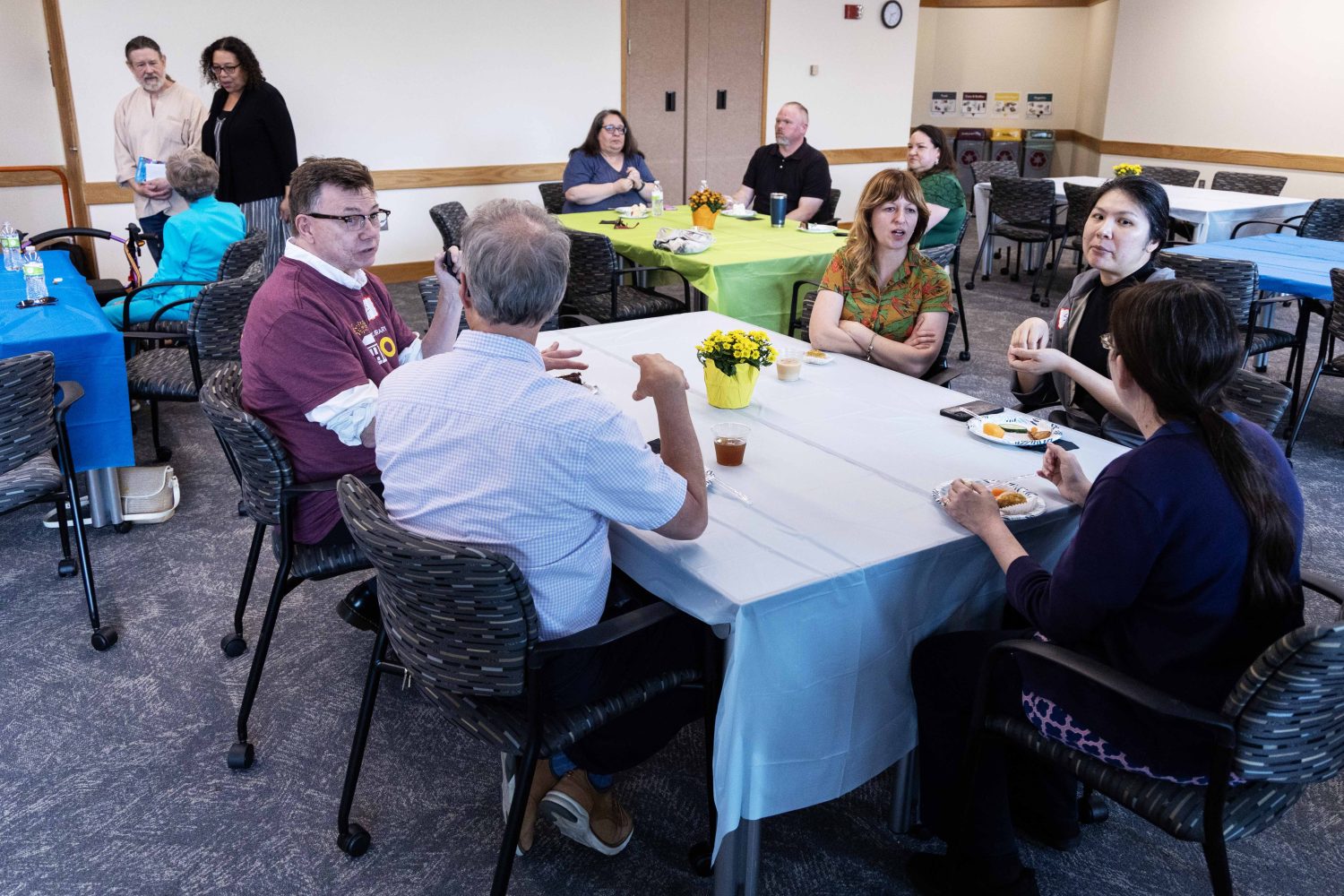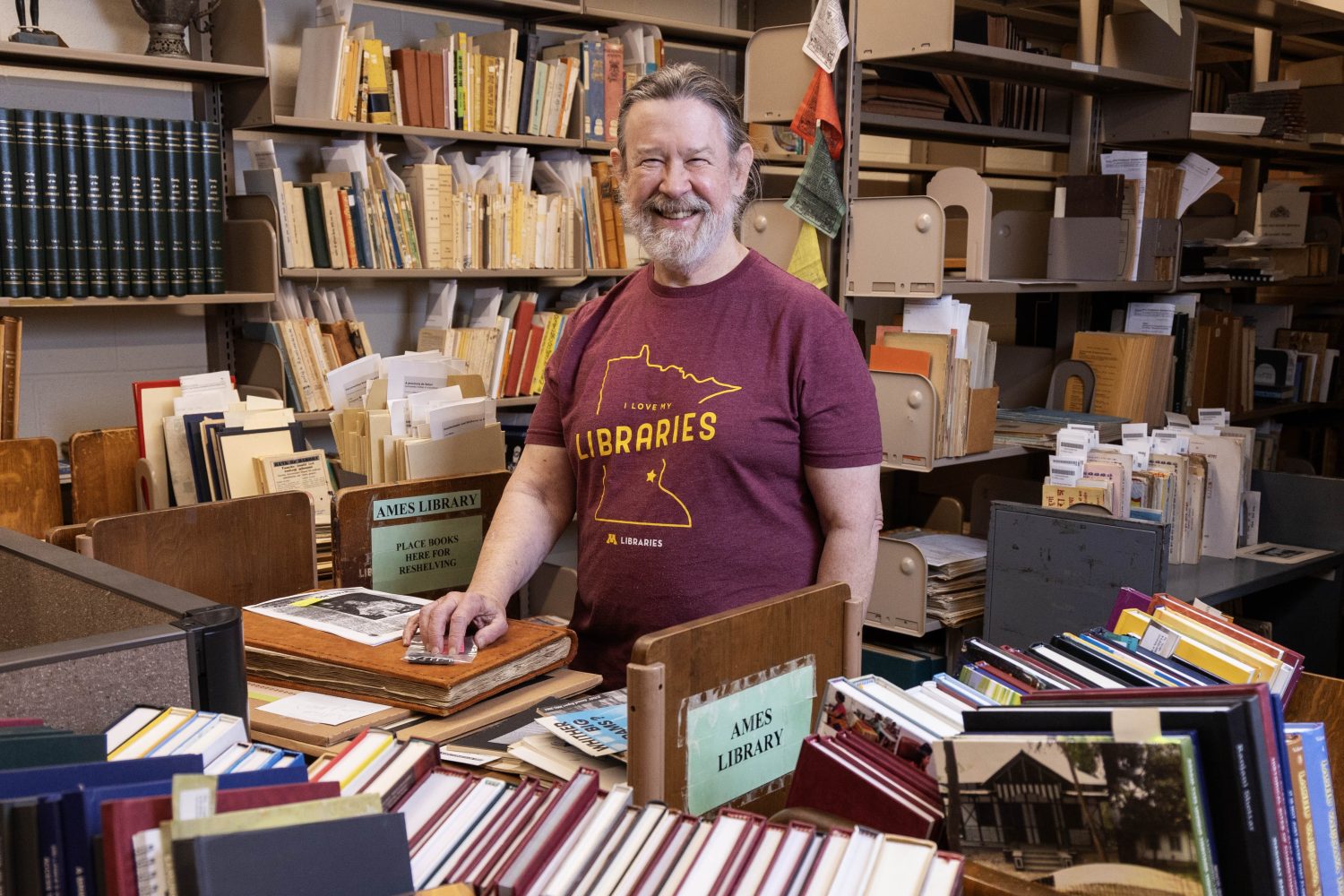
David Faust, the South Asia and Middle East Librarian, poses for a portrait in his office in Wilson Library on Wednesday, September 4, 2024. Faust is retiring from the Libraries this month. (Photo/Adria Carpenter)
David Faust isn’t ready for retirement, but he knows it’s time.
“I think it’s something I should do. I think I ought to get to other things that have been waiting. I think I should make space for somebody else, but I’ve got a deep attachment here,” he said.
Faust first started working in the Ames Library of South Asia as a doctoral student in 1987, working there off and on until 2000, when he returned for the long haul. His office is a miniature library with floor-to-ceiling shelves and rolling carts, each filled with books waiting to be cataloged.
“There is a lot of unfinished business, but when my boss left, there was lots of unfinished business then as well,” Faust said. “You just keep chipping away at it. He chipped away at it in a pretty major way, and I’ve continued working on it. But there is always something new to do, too.”
A trip to Pakistan that changed his life
Faust, the South Asia and Middle East librarian, was born and raised in Newton, Iowa, a small industrial town just outside the state capital.
Growing up, Faust kept a curious eye on life and cultures outside the confines of his town and country, but it was more of a passion than a profession. At Iowa State University, he majored in economics and international studies.
One summer he joined a small group of students on a field trip to Pakistan, led by his Pakistani geography professor. Like the U.S., Pakistan was a different place in the 1970s than it is today, he said. The country was stunningly beautiful, with unmatched hospitality and generous people.

David Faust, the South Asia and Middle East Librarian, poses for a portrait with his mother during his retirement party on Tuesday, September 10, 2024. (Photo/Adria Carpenter)
Faust’s group traveled the country by train and a small van, through mountainous areas and plains, on highways and along canals, stopping to meet people and explore places like the Khyber Pass, the Swat valley, cities from Peshawar to Lahore and Karachi to Quetta, including the capital city of Islamabad, as well as sites of the ancient Indus Valley Civilization.
“The food, the people, the landscapes, the history, all of it grabbed me and forever changed who I was,” he said.
Faust finished his undergraduate degree and then went to the University of Iowa to complete his master’s in economics. He moved to Minnesota to work as an economist for the Department of Public Service, but after a couple of years, he became so bored with the job that he decided to switch careers.
“I didn’t just randomly quit. I stopped and thought back about my life up to that point and what had been the thing that had really influenced me the most. And it was that field trip to Pakistan,” he said.
‘Do you know anybody who’s looking for a job?’
Faust enrolled at the University of Minnesota, working on his master’s in South Asian Languages. He remembers talking with his advisor about pursuing his doctorate when Donald Johnson, the incoming curator of the Ames Library of South Asia, called looking for a graduate student worker.
When Faust visited the Ames Library, located in the sub-basement of Wilson Library, he was instantly enamored with its holdings. The library collects current and historic materials from and about South Asia, including Afghanistan, Bangladesh, Bhutan, Nepal, Pakistan, Sri Lanka, Myanmar, and Tibet.
Faust walked into Johnson’s office – the same office he would later inherit – to interview about the graduate student position. Johnson said if he decided to continue his studies, Faust would have a job in the Ames Library, so he accepted the position and began his doctorate in geography.
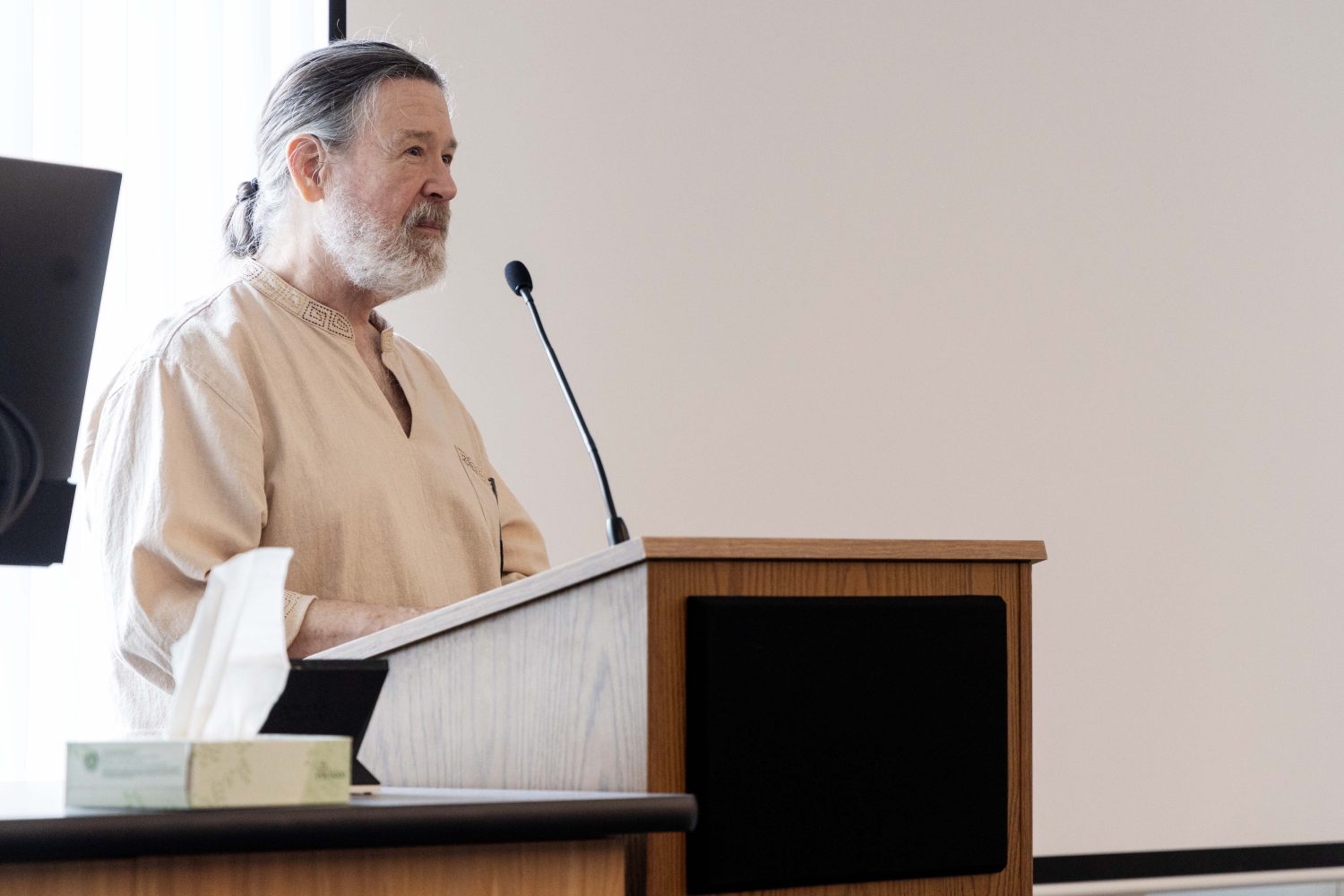
David Faust reflects on his time at the Libraries during his retirement party on Tuesday, September 10, 2024. (Photo/Adria Carpenter)
Between manning the reference desk and completing his coursework, Faust did fieldwork in western India for his dissertation throughout the early 1990s. There he researched grassroots rural development organizations as one alternative to neoliberal World Bank-led destructive development.
“In 2000, having worked as a part-time instructor and a postdoc, and with a young child, I thought, ‘Geez, I’m more excited about enabling people to do important research than I am about pursuing a high-stress, tenure-track academic career. And I think it would be a crime to have my daughter have two tenure-track parents,’” he said.
Faust returned to the Ames Library to read the South Asian newspapers, where he ran into Johnson, still in the same office. Johnson asked, “Do you know anybody who’s looking for a job?” and Faust replied, “Well maybe me.”
Faust started as a part-time copy cataloger, adding books mostly from India into the library’s collection. But given his background and education, he unofficially acted as a full-fledged librarian.
“I was regularly working way above my pay grade in the library, but that’s what made the job interesting,” he said.
‘I like finding things for people’
With Johnson’s help, Faust became a full-time staff member in the Ames Library, and when Johnson retired in 2008, it seemed only natural that he would take over, since Faust was already enmeshed in the university community and was already doing the job.
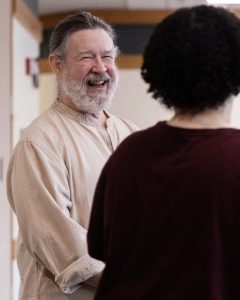
David Faust, the South Asia and Middle East Librarian, talks with friends and coworkers at his retirement party on Tuesday, September 10, 2024. (Photo/Adria Carpenter)
Along the way, Faust’s responsibilities expanded, geographically, to include the Middle East, and, internally as the collections coordinator for the Libraries’ Arts, Humanities and Area Studies; and Social Sciences Departments.
To acquire international publications, Faust typically works with the Library of Congress to source humanities and social sciences related materials, which mostly are distributed to Ames or Wilson, with some heading across campus to the Architecture Library, Magrath Library, the Music Library, and the Law Library.
Faust also interfaces with the faculty members, students, and researchers, helping them with research projects, answering reference questions, and teaching course-related research skills to undergraduates; “Typical librarian things,” he said.
He particularly enjoys facilitating other people’s research and investigating complex topics, from helping graduate students in India navigate Indian bureaucracies, to tracking down obscure books for specialized research projects of faculty.
“I like finding things for people,” Faust said. “I managed to find things in Arabic for Arabic speakers even though I don’t read or speak Arabic. It’s librarian magic.”
Unlike a discipline-based librarian, an international librarian has a more generalized scope. So while he helps people from the Department of Asian and Middle Eastern Studies, he also sees people from Geography, Environment and Society; Gender, Woman, and Sexuality Studies; and scholars of English, history, political science, forestry, and many more.
“At some level, I handle all subjects, if the region is South Asia or the Middle East,” he explained. “Context is crucially important, so regional knowledge and understanding is essential.”
‘Librarians are all about helping’
Faust doesn’t like to tout his own accomplishments, but he’s proud to serve as the unofficial head of a Big Ten Academic Alliance group exploring collaborative collection development for Middle East collections.
He is also proud to have participated in a U of M Libraries report on how international and area studies collections are fundamentally different from typical disciplinary collections, and how the university and administrators can best support these collections.
“I’m generally a squeaky wheel around here, which I’m happy to be. And that’s how I got made the ringleader of the BTAA group,” Faust said.
Collaborating with other libraries across the country has quickly become his favorite part of being librarian. The Ames Library, for example, is one of 32 libraries in the South Asia Cooperative Collection Development Workshops, a decades-long collaboration among librarians to create a broad, deep, and diverse North American collection of research materials related to South Asia.
And more recently, Faust has been a leader in the South Asia Open Archives, an online collection of primary sources from and about South Asia, that is free and accessible to the public.
“It’s these kinds of collaborations to do something bigger and beyond the university that I’ve really been enjoying lately,” he said.But the biggest highlight of the Libraries has been the people, especially his coworkers. In keeping with his “squeaky wheel” persona, Faust has been mentoring other people in collections development, which he’s found “very rewarding.”
“I’ve been here longer than most people … So I have a depth of experience, and I can end up advising on lots of different things,” he said.
At some level, all of these rewarding aspects are also challenging. There can be constraints, complications, debates, stagnation. But he’s buoyed by the collegiality and constructive spirit that he finds among his colleagues.
As Faust reminisces in his office, the moment is bittersweet. He speaks softly and plainly, but his laugh fills the room. And when he smiles, his eyes crinkle into crescents.
“This room has been part of my life for most of the last 40 years, and some of those books over there have been waiting that whole time to get cataloged,” he said. “It’s really frustrating. There’s so many things I would’ve liked to have been able to say I got finished.”
While he’ll miss the Ames Library after retirement, he’ll miss his colleagues at the Libraries more.
“I just feel deeply fortunate to have such a fabulous group of colleagues. In an academic environment where things can be so competitive, I am blessed by colleagues in this library who are overwhelmingly kind, helpful, collaborative, and generous, and who really want to engage with our varied communities to create the best outcomes. And I’m probably failing to do them justice,” Faust said. “They know what they’re doing, and they like to help people … Librarians are all about helping, facilitating, and partnering to make good things happen.”
- David Faust talks with friends and colleagues during his retirement party on Tuesday, September 10, 2024. (Photo/Adria Carpenter)
- Groups mingle at David Faust’s retirement party on Tuesday, September 10, 2024. (Photo/Adria Carpenter)
- Attendees talk during David Faust’s retirement party on Tuesday, September 10, 2024. (Photo/Adria Carpenter)
- Sunshine Carter, director of Collection Strategy and eResource Management, talks with colleagues at David Faust’s retirement party on Tuesday, September 10, 2024. (Photo/Adria Carpenter)
- Attendees listen to stories about David Faust during his retirement party on Tuesday, September 10, 2024. (Photo/Adria Carpenter)
- Attendees listen to stories about David Faust during his retirement party on Tuesday, September 10, 2024. (Photo/Adria Carpenter)
- Attendees listen to stories about David Faust during his retirement party on Tuesday, September 10, 2024. (Photo/Adria Carpenter)
- Ryan Mattke, the map and geospatial information librarian, talks with colleagues at David Faust’s retirement party on Tuesday, September 10, 2024. (Photo/Adria Carpenter)
- David Faust talks with friends and colleagues during his retirement party on Tuesday, September 10, 2024. (Photo/Adria Carpenter)
- Groups mingle at David Faust’s retirement party on Tuesday, September 10, 2024. (Photo/Adria Carpenter)


